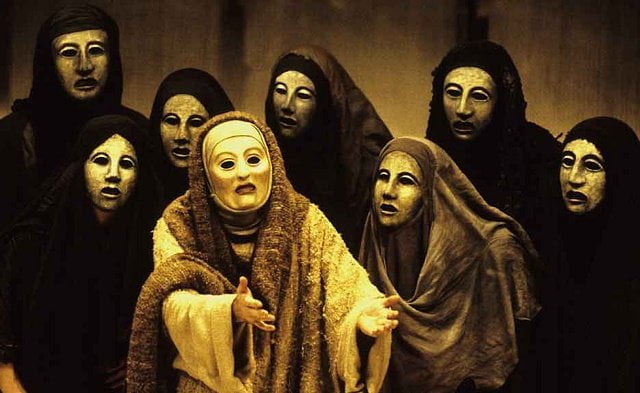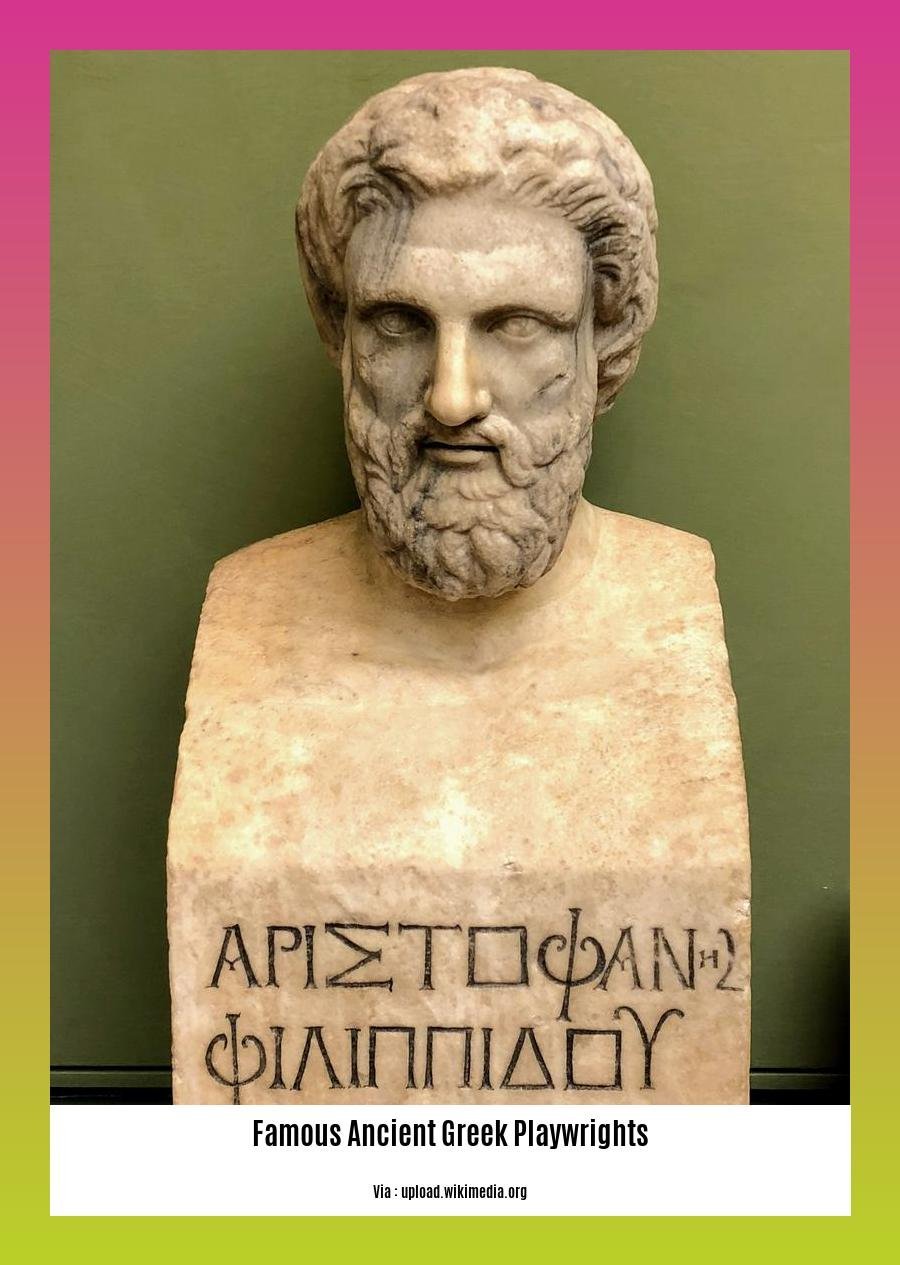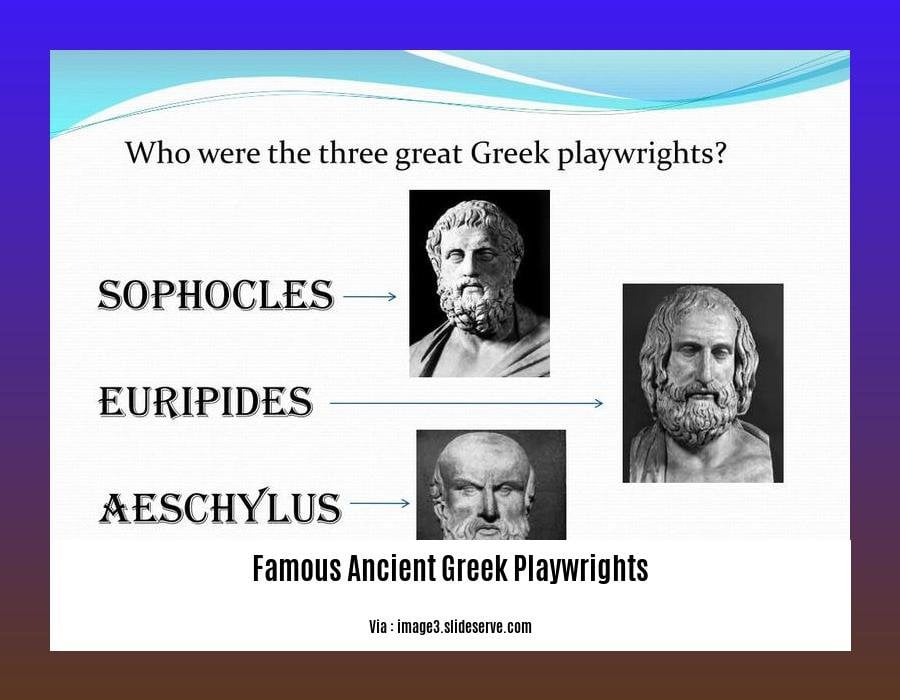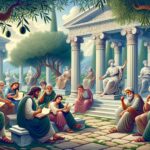Prepare to be transported to the captivating realm of ancient Greek drama! Join us as we embark on a thrilling journey into the legacy of its legendary playwrights: Aeschylus, Sophocles, and Euripides. These literary giants have forever transformed theatre with their timeless plays, resonating deeply with generations of readers and playgoers. Let’s dive into their profound themes, unforgettable characters, and revolutionary techniques that have etched their names into the annals of literature, shaping storytelling and inspiring countless artists throughout history.

Famous Ancient Greek Playwrights: The Legends Behind the Curtain
In the vibrant world of theater, we owe a great debt to the ancient Greek playwrights who laid the foundation for our modern-day stage. These literary masters not only entertained audiences but also explored the deepest recesses of human nature, teaching us valuable lessons about life, morality, and the relentless pursuit of destiny.
Meet the Three Titans of Greek Tragedy
Aeschylus: The Trailblazer
Aeschylus, the “Father of Tragedy,” was the first to introduce a second actor to the stage, adding depth and complexity to performances. His legendary “Oresteia” trilogy delves into the haunting themes of justice, revenge, and the inescapable consequences of our actions.
Sophocles: The Character Wizard
Sophocles, the master of character development, brought a third actor to the fold, allowing for even more intricate interactions. His masterpiece, “Oedipus Rex,” is a timeless tale of a man’s tragic downfall, expertly weaving together fate, free will, and the devastating power of truth.
Euripides: The Social Commentator
Euripides, known for his psychological insights, fearlessly tackled social issues and human suffering in his plays. In “Medea,” he explores the complexities of love, betrayal, and the lengths a mother will go to protect her children.
Their Impact on Modern Theater
These ancient giants revolutionized theater forever. Their artistry, storytelling prowess, and ability to tap into the human psyche have left an enduring legacy that continues to inspire playwrights and performers today. Their works have been adapted, reimagined, and brought to life countless times on stages around the globe, reminding us of the timeless power of the theater to move, provoke, and enlighten us.
Table of Noteworthy Works
| Playwright | Notable Plays |
|---|---|
| Aeschylus | The Oresteia Trilogy |
| Sophocles | Oedipus Rex, Antigone |
| Euripides | Medea, The Bacchae |
In Summary:
– Famous ancient Greek playwrights shaped the course of theater and storytelling, leaving an indelible mark on literature, culture, and society.
– Their plays continue to resonate today, serving as timeless masterpieces that offer insights into the human condition and the complexities of life.
Explore the evolution of education by uncovering the distinctions between ancient and modern educational practices and philosophies.
Delve into the contrasts between ancient and modern education systems, and discover how pedagogical approaches have transformed over time.
Discover the differences between the ancient and modern Olympics, and witness how this prestigious sporting event has evolved from its origins in ancient Greece to its current global spectacle.
Unravel the chronological narrative of ancient Israel, as you follow the captivating timeline of this ancient civilization and uncover its rich history and cultural significance.

How did ancient Greek plays influence the development of Western theatre?
Imagine stepping into an ancient Greek amphitheatre, where the vibrant energy of the crowd fills the air. As the play unfolds before your eyes, you witness the birth of a theatrical tradition that would forever shape the Western world.
The Blueprint of Theatre
Greek playwrights laid the foundation for theatre as we know it. They pioneered the division into acts, separating the play into distinct segments that allowed for dramatic tension and release. Their use of dialogue, spoken by characters on stage, brought stories to life and engaged audiences in a way that had never been done before.
Timeless Themes that Touch the Human Soul
Ancient Greek dramas explored universal themes that continue to resonate with us today. The struggle between fate and free will, the search for justice, the hubris of the arrogant, and the complexities of human relationships – these timeless truths have been brought to life through Greek plays and continue to spark discussions and inspire audiences.
Character Archetypes: The Building Blocks of Drama
From the heroic protagonist to the treacherous antagonist, Greek playwrights introduced character archetypes that have become the cornerstones of Western theatre. These archetypes embody universal human traits, making them familiar and relatable to audiences of all ages and cultures.
Innovative Techniques: Adding Depth and Emotion
Greek playwrights were not only masters of storytelling but also innovators in dramatic techniques. They incorporated the chorus, a group of performers who commented on the action and provided insights, adding depth and perspective to the plays. The deus ex machina, a literal “god from the machine,” brought about sudden and dramatic resolutions, leaving audiences in awe. Masks allowed actors to portray multiple characters with distinct personalities, enhancing the theatrical experience.
A Legacy that Lives On
The influence of ancient Greek plays on modern theatre cannot be overstated. Contemporary playwrights continue to draw inspiration from Greek mythology, themes, and theatrical conventions. The open-air amphitheatres designed for Greek dramas have shaped the architecture of modern theatres, providing a unique and immersive setting for live performances.
Lessons Learned from the Masters
Key Takeaways:
- Greek plays established the structural elements of Western theatre, including acts, dialogue, and conflict resolution.
- They explored timeless themes that connect with audiences across generations.
- Greek playwrights created character archetypes that have become the building blocks of dramatic storytelling.
- Innovative techniques, such as the chorus and masks, enhanced the emotional impact and depth of their plays.
- Ancient Greek plays have left an enduring legacy that continues to influence the evolution of modern theatre.
So, there you have it, the story of how ancient Greek plays laid the groundwork for Western theatre. From their structural innovations to their enduring themes and captivating techniques, these plays have played a vital role in shaping the theatrical tradition we enjoy today.
What were the key characteristics of Greek tragedy and comedy?
Imagine yourself sitting in the vast amphitheater of ancient Greece, the sun casting its glow upon the stage that awaits a theatrical spectacle unlike any other. Two distinct genres ruled the Greek stage: tragedy and comedy, each boasting unique attributes that captivated and entertained audiences. Let’s dive into the world of Greek drama and explore their key characteristics.
Greek Tragedy – A Tapestry of Gods and Heroes
- Mythology weaves the tale: Greek tragedies often found their inspiration in the rich tapestry of Greek mythology, where the gods and heroes of legend played pivotal roles. These stories explored themes of fate, hubris (excessive pride), and the consequences of human actions.
- Language of the divine: The language of tragedy soared to poetic heights, filled with elaborate metaphors and vivid imagery. Through these grand words, playwrights communicated the weighty themes at the heart of their stories.
- Chorus of wisdom: A group of 12 to 15 individuals, known as the chorus, served as the collective voice of wisdom and reflection. They provided commentary, sang songs, and offered insights into the unfolding drama.
- Emotional catharsis: Greek tragedies aimed to evoke a sense of pity and fear in the audience. This emotional purging, or catharsis, allowed spectators to grapple with the complexities of human existence.
- Flawed yet noble heroes: The tragic heroes were often individuals of noble character, yet they possessed fatal flaws. Their struggles and downfalls, often brought about by their own actions or by the whims of fate, formed the core of these dramatic tales.
Greek Comedy – Laughter at the Heart of Life
- A mirror to society: Comedy did not shy away from holding up a mirror to society. Playwrights used humor to poke fun at politicians, criticize social norms, and comment on current events.
- Farce and slapstick: Greek comedy embraced the art of farce and slapstick humor. Exaggerated characters, physical comedy, and ridiculous situations kept audiences laughing throughout the performance.
- Characters from all walks of life: Unlike tragedy, comedy drew its characters from all levels of society. They represented different social classes, occupations, and personalities, playfully highlighting the foibles and follies of human nature.
- Happy endings prevail: In contrast to tragedy, Greek comedies typically offered a satisfying and happy resolution. Even if the path to happiness was filled with absurdity and hilarity, audiences could always expect a cheerful outcome.
Conclusion
Greek theatre was a vibrant tapestry woven with the threads of tragedy and comedy. Each genre possessed its unique charm, captivating audiences with its exploration of human emotions, social issues, and the enduring themes of life and fate. Whether you were moved to tears by the struggles of a tragic hero or delighted by the antics of a comedic character, Greek drama left an unforgettable mark on the world of theatre and continues to inspire audiences today.
What were the origins and history of ancient Greek theatre?
Immerse yourself in the intriguing world of ancient Greek theatre, where drama came to life and captivated audiences. Its origins are rooted in religious rituals, dating back to a time when gods and mortals intertwined.
Journey to the Beginnings:
Like many great things, Greek theatre had humble beginnings. It emerged from sacred festivals honoring Dionysus, the deity of wine and all things merry. During these festivals, people would gather to perform choral songs called dithyrambs, praising the god and celebrating his revelry.
The Birth of Theatre in Athens:
As these festivals gained popularity, they found a home in the bustling city of Athens. The Amphitheatre of Dionysus, an iconic landmark, became the epicenter of Greek theatre. Here, playwrights showcased their works, captivating audiences with stories of gods, heroes, and ordinary people.
Evolution of Drama:
Over time, Greek theatre evolved from simple choral performances to more sophisticated dramas. Playwrights like Aeschylus, Sophocles, and Euripides introduced actors, allowing for complex characters and engaging narratives. They explored themes of human suffering, destiny, and the comical side of life through tragedy and comedy.
Key Elements of Greek Theatre:
- Chorus: A group of actors who provided insights, sang, and danced throughout the play.
- Actors: Skilled performers who brought characters to life, using masks to convey emotions.
- Tragedy: Plays exploring serious themes of suffering, fate, and the human condition.
- Comedy: Plays featuring humor, satire, and social commentary.
- Mask: An essential tool for actors, used to hide their identities and enhance emotions.
Legacy of Greek Theatre:
Ancient Greek theatre has left an enduring legacy on Western culture. Its influence can be seen in modern plays, films, and storytelling techniques. It ignited the spark of creativity and inspired generations of artists to explore the human experience through the lens of drama.
FAQ
Q1: Who are the most famous ancient Greek playwrights?
A1: The most famous ancient Greek playwrights are Aeschylus, Sophocles, and Euripides.
Q2: What are the key characteristics of Greek tragedy?
A2: Greek tragedy is characterized by its focus on serious themes, such as fate, justice, and suffering. It often features a protagonist who is flawed and makes mistakes that lead to their downfall.
Q3: What are the key characteristics of Greek comedy?
A3: Greek comedy is characterized by its use of humor and satire to poke fun at social and political issues. It often features stock characters, such as the clever slave or the foolish old man.
Q4: What is the legacy of ancient Greek playwrights?
A4: The ancient Greek playwrights have had a profound legacy on Western literature and theater. Their works have been adapted and performed for centuries, and they continue to inspire new generations of artists.
Q5: What are some of the most famous plays by ancient Greek playwrights?
A5: Some of the most famous plays by ancient Greek playwrights include Aeschylus’ “Oresteia,” Sophocles’ “Oedipus Rex,” and Euripides’ “Medea.”
- Unveiling the Enigma: Mansoureh Khojasteh Bagherzadeh’s Public Appearances & Private Life in Iran - July 18, 2025
- Unveiling the Mystery: Mansoureh Khojasteh Bagherzadeh’s Husband: A Rare Glimpse into a Private Life - July 18, 2025
- Unveiling Masoud Khamenei’s Mother: Power, Influence, and Iran’s Future - July 18, 2025
















